- Clone
- 122 (See other available formats)
- Regulatory Status
- RUO
- Workshop
- HCDM listed
- Other Names
- TR2, Herpesvirus entry mediator A, Tumor necrosis factor receptor superfamily, member 14, TNFRSF14, Tumor necrosis factor receptor like 2, HVEM
- Isotype
- Mouse IgG1, κ
- Ave. Rating
- Submit a Review
- Product Citations
- publications
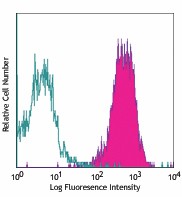
-

Human peripheral blood lymphocytes stained with purified 122, followed by biotinylated anti-mouse IgG and Sav-PE
| Cat # | Size | Price | Quantity Check Availability | Save | ||
|---|---|---|---|---|---|---|
| 318802 | 100 µg | 206 CHF | ||||
The 122 antibody recognizes human HVEM also known as herpesvirus entry mediator A, tumor necrosis factor receptor superfamily, member 14, TNFRSF14, and tumor necrosis factor receptor like 2. HVEM, a member of the TNFR superfamily, is a type I transmembrane protein containing 2 TNF receptor domains with a predicted molecular weight of approximately 30 kD. HVEM is widely expressed in blood vessels, brain, heart, kidney, liver, lung, prostate, spleen, thymus and other organs. Resting T cells and naïve and memory B cells express high levels of HVEM as well. In humans, HVEM is not expressed in germinal center B cells. Immature dendritic cells express high levels of HVEM that is downregulated upon maturation. HVEM plays an important role in herpes simplex virus pathogenesis by enhancing entry into cells. Signaling through HVEM activates JNK1, NF-κB and AP-1 to control gene expression in response to infection or cellular stress and activate the immune response. HVEM binds to LIGHT and has also been shown to associate with several other proteins including TRAF1, TRAF2, TRAF3, TRAF5, B and T lymphocyte associated protein (BTLA), and estrogen receptor alpha.
Product DetailsProduct Details
- Verified Reactivity
- Human
- Reported Reactivity
- African Green, Baboon, Cynomolgus, Rhesus
- Antibody Type
- Monoclonal
- Host Species
- Mouse
- Immunogen
- Recombinant human HVEM protein
- Formulation
- Phosphate-buffered solution, pH 7.2, containing 0.09% sodium azide.
- Preparation
- The antibody was purified by affinity chromatography.
- Concentration
- 0.5 mg/ml
- Storage & Handling
- The antibody solution should be stored undiluted between 2°C and 8°C.
- Application
-
FC - Quality tested
WB, ELISA - Reported in the literature, not verified in house - Recommended Usage
-
Each lot of this antibody is quality control tested by immunofluorescent staining with flow cytometric analysis. For flow cytometric staining, the suggested use of this reagent is ≤1.0 µg per million cells in 100 µl volume. It is recommended that the reagent be titrated for optimal performance for each application.
- Application Notes
-
The 122 antibody has been shown to be useful for flow cytometry, Western blot, and ELISA.
-
Application References
(PubMed link indicates BioLegend citation) - Product Citations
-
- RRID
-
AB_2303380 (BioLegend Cat. No. 318802)
Antigen Details
- Structure
- Member of the TNFR superfamily, type I transmembrane protein containing 2 TNF receptor domains. Predicted molecular weight approximately 30 kD.
- Distribution
-
Widely expressed in blood vessels, brain, heart, kidney, liver, lung, prostate, spleen, thymus and other organs. Resting T cells and naïve and memory B cells express high levels of HVEM. Immature dendritic cells express high levels of HVEM that is downregulated upon maturation.
- Function
- Plays an important role in herpes simplex virus pathogenesis by enhancing entry into cells. Signaling through HVEM activates JNK1, NF-κB and AP-1 to control gene expression in response to infection or cellular stress and activate the immune response.
- Interaction
- TRAF1, TRAF2, TRAF3, TRAF5, B and T lymphocyte associated protein (BTLA), and estrogen receptor alpha have been shown to directly interact with HVEM in vivo.
- Ligand/Receptor
- LIGHT (TNFSF14), LTα
- Cell Type
- B cells, Dendritic cells, T cells
- Biology Area
- Cell Adhesion, Cell Biology, Immunology, Signal Transduction
- Molecular Family
- Adhesion Molecules, CD Molecules
- Antigen References
-
1. Carfi A, et al. 2001. Molec. Cell 8:169.
2. Gonzalez LC, et al. 2005.Proc. Nat. Acad. Sci. 102:1116.
3. Kwon BS, et al. 1997. J. Biol. Chem. 272:13471.
4. Marsters SA, et al. 1997. J. Biol. Chem. 272:14272.
5. Montgomery RI, et al. 1996. Cell 87:427. - Gene ID
- 8764 View all products for this Gene ID
- UniProt
- View information about CD270 on UniProt.org
Other Formats
View All CD270 Reagents Request Custom Conjugation| Description | Clone | Applications |
|---|---|---|
| Purified anti-human CD270 (HVEM, TR2) | 122 | FC,WB,ELISA |
| PE anti-human CD270 (HVEM, TR2) | 122 | FC |
| APC anti-human CD270 (HVEM, TR2) | 122 | FC |
| PE/Cyanine7 anti-human CD270 (HVEM, TR2) | 122 | FC |
| PerCP/Cyanine5.5 anti-human CD270 (HVEM, TR2) | 122 | FC |
| TotalSeq™-A0020 anti-human CD270 (HVEM, TR2) | 122 | PG |
| TotalSeq™-C0020 anti-human CD270 (HVEM, TR2) | 122 | PG |
| PE/Dazzle™ 594 anti-human CD270 (HVEM, TR2) | 122 | FC |
| TotalSeq™-B0020 anti-human CD270 (HVEM, TR2) | 122 | PG |
| TotalSeq™-D0020 anti-human CD270 (HVEM, TR2) | 122 | PG |
Customers Also Purchased
Compare Data Across All Formats
This data display is provided for general comparisons between formats.
Your actual data may vary due to variations in samples, target cells, instruments and their settings, staining conditions, and other factors.
If you need assistance with selecting the best format contact our expert technical support team.
-
Purified anti-human CD270 (HVEM, TR2)
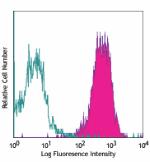
Human peripheral blood lymphocytes stained with purified 122... -
PE anti-human CD270 (HVEM, TR2)
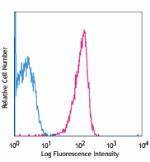
Human peripheral blood lymphocytes stained with 122 PE -
APC anti-human CD270 (HVEM, TR2)
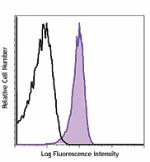
Human peripheral blood lymphocytes were stained with CD270 (... -
PE/Cyanine7 anti-human CD270 (HVEM, TR2)
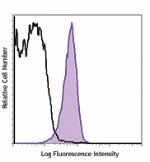
Human peripheral blood lymphocytes were stained with CD270 (... -
PerCP/Cyanine5.5 anti-human CD270 (HVEM, TR2)
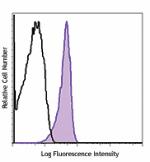
Human peripheral blood lymphocytes were stained with CD270 (... -
TotalSeq™-A0020 anti-human CD270 (HVEM, TR2)
-
TotalSeq™-C0020 anti-human CD270 (HVEM, TR2)
-
PE/Dazzle™ 594 anti-human CD270 (HVEM, TR2)

Human peripheral blood lymphocytes were stained with CD19 (c... -
TotalSeq™-B0020 anti-human CD270 (HVEM, TR2)
-
TotalSeq™-D0020 anti-human CD270 (HVEM, TR2)
 Login / Register
Login / Register 





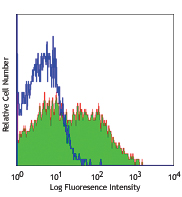
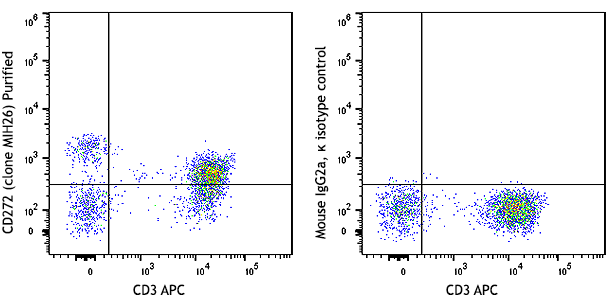
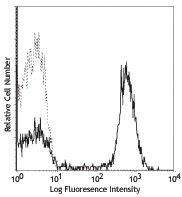




Follow Us